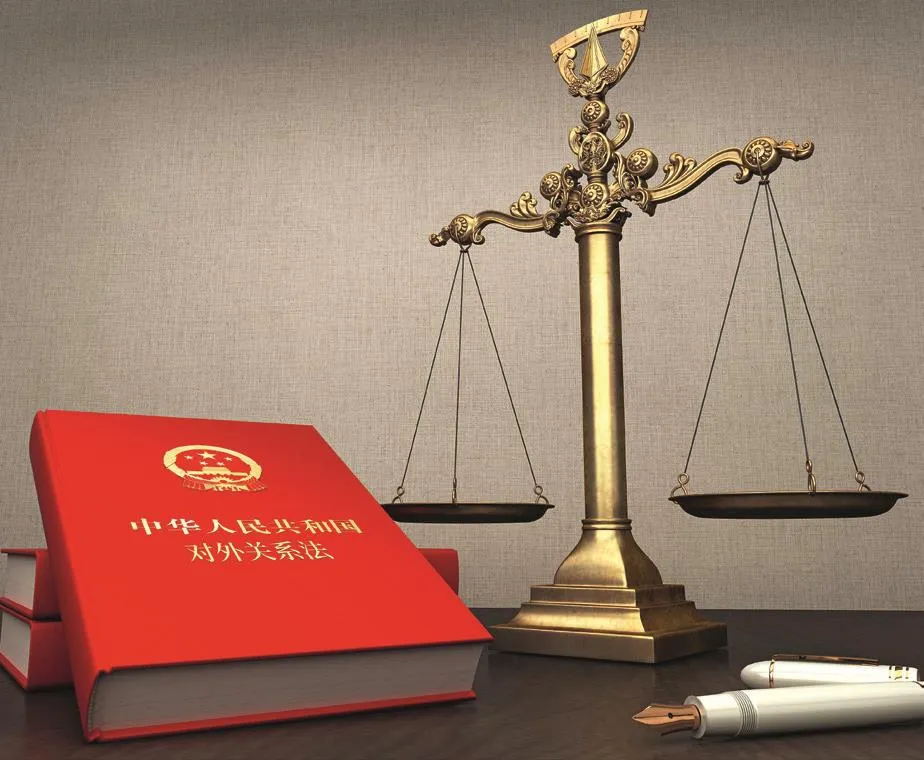Should the World Lose Sleep over China’s Foreign Relations Law?
By SUDESHNA SARKAR
Since a law creates a uniform, consistent, and foreseeable way of action, the Western fuss seems ungrounded.

China’s milestone Law on Foreign Relations, adopted by the National People’s Congress Standing Committee on June 28, takes effect on July 1.
AS China’s Foreign Relations Law came into effect on July 1, it was interesting to note the reactions preceding it.
They seemed to mainly belong to three schools of thought: The new law is “sweeping” and intended to act against deemed threats, according to CNN.The Financial Timessees it as a personal tool, strengthening President Xi Jinping’s response to sanctions, and warns it could “undercut Beijing’s efforts to woo overseas investors.” Bloomberg brings in the American angle, calling the “combative” law the Chinese leadership’s attempt to respond to a“slew of U.S.curbs.”
The negativity is not surprising, given the Western media’s increasingly hostile interpretation of whatever China does.What is surprising is the political naivete and focus on one article in a law that has 45 of them.
First and foremost, the law says nothing that is a stark departure from China’s avowed foreign policy.Article 1 makes that very clear.The new law is to basically “develop foreign relations, safeguard national sovereignty, security, and development interests.” It is also intended to build China into a socialist modern power and promote world peace and development, as well as build a community of shared future for all.So nothing new here.
Is it really “sweeping,” overriding all concerns and implementing a kind of dictatorship? Article 1 also makes it clear that the law is “according to the Constitution.” Besides, together with Article 19,it highlights that China “upholds the international order underpinned by international law, and the fundamental norms governing international relations based on the purposes and principles of the UN Charter.”
Or in other words, the new law is not an exercise in limitless power but follows recognized fountainheads of laws and regulations.
If the critics are candid, they will concede that this fear of a “sweeping” new law stems from Article 5, which says China will follow “the centralized and unified leadership of the Communist Party of China(CPC)” in its foreign affairs.
The negativity is a continuation of the historical animosity towards a political system.It’s the ghost of McCarthyism, the persecution of communists in the 1950s under then U.S.Senator Joseph McCarthy which, seven decades on, still refuses to be exorcized.
However, the U.S.needs to learn to live with the fact that different nations may choose different political and governance systems and the era of seeking regime changes simply because Washington disapproves of them is gone.
China has been open about following its own path, suited to its own conditions, aspirations, andphilosophy.The new law reiterates that besides Marxism-Leninism, China will follow its homegrown directives like Xi Jinping Thought on Socialism with Chinese Characteristics for a New Era,Deng Xiaoping Theory, and the Scientific Outlook on Development proposed in 2003 to deal with issues including excessive resource consumption,environmental degradation and the widening gap between the rich and poor.
In addition, under the central authorities, there is also a top-to-bottom allocation of responsibilities, from the State Council, China’s cabinet, to the Ministry of Foreign Affairs, the various Chinese embassies and consulates abroad, and even local governments.
Regarding the conjecture that the new law could impact foreign investors, it’s mere speculation not grounded in data.In fact, the figures tell a different story.China was the second largest receiver of foreign direct investment (FDI) in 2022, attracting over US $189 billion.This was an eight percent rise over 2021, continuing an upward trajectory for three consecutive years.
And reports about new FDI keep coming in.During the first week of July, the CEO of U.S.pharmaceutical and biotechnology company Moderna came to Shanghai to discuss a US $1 billion investment for multiple projects, which would be Moderna’s debut in China.
It should also be borne in mind that in June 2021,China passed a law to counter foreign sanctions,which too was described as “sweeping” by the Western media.However, in spite of that, foreign investors have not shied away.In the first five months of 2023, actual use of FDI in the Chinese mainland was up by 0.1 percent year on year, at RMB 574.81 billion(US $79 billion).So maybe it’s prudent to first see the results this year and then prophesy.
The main source of the gloom-and-doom scenario is Article 33, which says China has the right to take corresponding countermeasures and restrictive measures against acts that violate international law and basic norms of international relations and endanger its sovereignty, security, and development interests.
Naysayers are interpreting it to mean sanctions against the United States and perhaps Europe,though the law does not specify any particular country.But isn’t it a given that any nation will retaliate against those it perceives as endangering its own interests? So this too is nothing new.
On the other hand, the law creates a uniform,consistent and foreseeable way of action.Surely that is preferable to random acts of reprisal that are actually the mark of dictatorship.Since Donald Trump declared a trade war on China with tariffs unleashed in phases, the U.S.remains inconsistent and random in its trade measures against China.
After slapping erratic curbs on export of high technology and equipment to China, the White House seems to be once again mulling fresh bans,according to reports.Such erratic and unpredictable action bodes good for none, including the U.S.itself.
Reacting to the reports, Colette Kress, chief financial officer of American technology firm Nvidia,said the restrictions, over the long term, “would result in a permanent loss of opportunities for the U.S.industry to compete and lead in one of the world’s largest markets and impact on our future business and financial results.”
In comparison, China’s response has been consistent and predictable.China opposes sanctions and advocates negotiations or going to appropriate institutions like the World Trade Organization to resolve disputes.The Foreign Investment Law that came into effect in 2020 guarantees that foreign investment will not be expropriated unless the circumstances are exceptional.And in that case,foreign investors will be paid “timely and reasonable compensation.”
These assurances are clinched by Article 33,which says China has the right to take corresponding countermeasures.The meaning is clear.Like pledging no first nuclear strike, the new law assures that China will not be the first to target anyone.It will take countermeasures only if someone takes unfair measures against it.So those who don’t plan to take arbitrary, unfair or illegal action against China don’t need to lose sleep over the new law.
speculation
Regarding the conjecture that the new law could impact foreign investors, it’s mere speculation not grounded in data.

